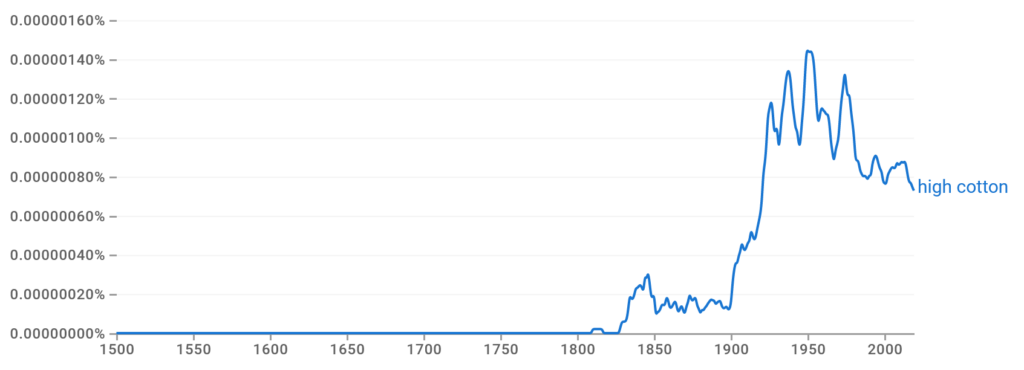In high cotton means being in a favorable or prosperous situation. It’s like being in a good place or doing well in life.
An idiom, such as high cotton, is a phrase that has a figurative meaning beyond its literal interpretation. These expressions are essential to grasp because they add depth and richness to the English language, allowing for more nuanced communication.
In this article, I delve into the idiom high cotton, exploring its literal and figurative meanings and intriguing origins. I provide practical examples and tips for using the expression effectively in conversation and writing. By mastering idioms like high cotton, you’ll speak and write English fluently and authentically, akin to a native speaker.
Join me as I explain the intricacies of high cotton, offer guidance on its usage, and present a quick quiz to test your understanding. Let’s embark on this journey together and elevate your language skills to new heights!
What Does the Idiom High Cotton Mean?
The idiom high cotton means being in a prosperous or advantageous situation. It originated in the American South, where high cotton referred to the tall, healthy cotton plants that were abundant and profitable. So, saying someone is in high cotton means they are doing well, whether financially, socially, or otherwise.
According to the Free Dictionary, the idiom high cotton means “a state of success (likened to the image of a field of well-growing cotton plants).”
Many idioms, like this one, have literal and figurative meanings. You can use this phrase in formal and informal situations, but be sure the context is appropriate, and your audience understands your meaning.
Literal Meaning vs. Figurative Meaning
The literal meaning of high cotton refers to the tall, healthy cotton plants that are abundant and profitable, particularly in the American South. Figuratively, the phrase means that someone is very successful, having worked hard for what they have.
Variations of the Idiom
Variations of idioms are simply modifications or slightly different words or phrases that retain the expression’s meaning. You can use them to keep your language interesting, prevent repetition, and demonstrate your command of English.
Here are a couple of variations of the idiom:
- In high cotton
- Tall cotton
- In tall cotton
- Walking in tall cotton
- Standing in high cotton
How Is the Idiom High Cotton Commonly Used in Context?
The idiom high cotton is commonly used in various contexts to describe a favorable or prosperous situation. From discussions about financial success to social standing, this idiom captures the idea of being in a desirable position.
Let’s explore different ways to understand and use the idiom high cotton effectively, along with tips for its application and examples to illustrate its usage.
What Are the Different Ways to Use the Idiom High Cotton?
To give you a clearer idea of how you can use high cotton, here are some examples of its use in different situations.
- Literal usage: “Thanks to this year’s outstanding cotton crop, we’re high cotton for sure!”
- Financial success: “Ever since starting his own catering business, Bellamy has made a fortune; he’s now in high cotton financially.”
- Personal achievement: “Getting selected for the first team put her in high cotton among her teammates.”
- Career progression: “Getting that promotion really put her in high cotton at the office.”
- Success in business: “Winning this lucrative new contract has ensured our business is definitely in high cotton this quarter.”
- Accomplishing goals: “When I completed the Boston Marathon in a good time, that really put me in high cotton. After training so hard for months, the achievement made all the early morning runs, sweat, and tears so worth it!”
What Are Some Tips for Using the Idiom High Cotton Effectively?
- Know the context: The idiom should be used in situations where you want to express success, abundance, or prosperity.
- Consider your audience: Know whether your audience is familiar with this idiom before you use it, and be prepared to explain your meaning if necessary.
- Be descriptive: When using idioms, be ready to use descriptive language to help paint a clearer picture for your listeners.
- Use in positive situations: This idiom is generally used to convey positivity, so be sure to use it in situations where success, good fortune, and prosperity are the focus.
- Be mindful of regionality: Some idioms, including high cotton, are often regionally specific. Be prepared to familiarize your audience with the phrase or provide context for its use.
Where Can You Find Examples of the Idiom High Cotton?
You can find examples of the idiom high cotton in various contexts, including literature, conversations, and online articles. Literature, especially works set in the American South or featuring characters from that region, often use this idiom to depict prosperity or success.
Here are a few examples of the idiom’s use in online publications:
People were traveling in tall cotton until June of 1929, when a flood washed away the approach to the bridge. (The Baytown Sun)
“I can remember running that backhoe for $50 an hour and thinking I was in tall cotton,” he says. (Equipment World Magazine)
What Is the Origin of the Idiom High Cotton Meaning?
The idiom high cotton originated in the American South, where cotton was an important cash crop. When a cotton plant is tall or high, it is fully grown, robustly developed, and ready to pick, so a good harvest and big profits are to be expected.
How Did the Idiom Evolve Over Time?
Though the idiom in high cotton has been in use since the turn of the 20th century, it only became widely popular when Red Barber used them in the mid-20th century.
Red Barber was a baseball announcer from Mississippi who was famous for using colorful idioms like walking in tall cotton, tearing up the pea patch, and slicker than boiled okra.
What Are Some Related Terms to the Idiom High Cotton?
I find it helpful to know and understand a few related terms to clarify my meaning when I use the idiom. Using synonyms and antonyms is helpful, so here are a few to take away:
Synonyms
- In the lap of luxury
- Living the high life
- Living the good life
- On easy street
- On cloud nine
- In the pink
- In the catbird seat
Antonyms
- In dire straits
- Down and out
- Between a rock and a hard place
- In a tight spot
- In hot water
- On the ropes
- In the doldrums
In High Cotton: Test Your Knowledge!
Choose the correct answer.
What Have We Learned about the Idiom High Cotton?
High cotton or tall cotton is an idiom that signifies achieving great success in either business or personal endeavors. Idioms like this one are used figuratively to enrich conversations with vivid imagery, humor, and depth.
Throughout this discussion, we’ve explored the idiom’s meaning, delved into its origins, and offered practical tips and advice on its effective use in various contexts. Additionally, we’ve provided examples of how high cotton is used in popular media.
With this knowledge, you’re now equipped to incorporate this idiomatic expression confidently into your conversations and writing.If you enjoyed discovering the meaning behind high cotton, why not explore more idiom definitions on our site?
Check out some others we covered:



